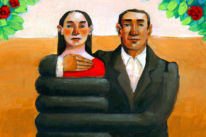“It’s not what you look at that matters, it’s what you see.” -Henry David Thoreau
Yesterday while driving home from the dentist, I listened to this CD my boyfriend made with theme songs from various movies.
While I generally would rather do a low crawl down a muddy sidewalk than sit in LA traffic, I couldn’t have been more blissful lost in the tunes of my favorite films.
I noticed something interesting during this peaceful drive.
While listening to The Pirates of the Caribbean theme song, I recognized all kinds of exciting things happening around me. This kid did a Back to the Future-style skateboard jump while crossing the street at the walk signal; and several yards away in the park, I saw a group of girls doing back flips. I realize these events aren’t as riveting as Johnny Depp escaping death, but in that moment, I felt their energy.
After the light turned green, I switched to the Forrest Gump theme song, and noticed numerous poignant moments in the moving picture outside my window—a little boy running and jumping into his mother’s arms, and a woman bending down to help a homeless man on the sidewalk. With the simple change of a song, I felt transported to a Lifetime special.
Suddenly I wondered: How often did the soundtrack in my head dictate what I chose to see?
At any given moment, there’s a lot of life happening around us. It’s far too much to take in all at once, which means we need to consciously choose where we place our attention—and how we perceive the things that we allow to hold our focus.
This is usually influenced by our mental state. When we’re angry, we’re more apt to find people annoying. When we’re hurt, people can seem insensitive. And when we’re happy, all of a sudden, the world seems like a kind and beautiful place.
Essentially, we narrate the world based on our moods, just like those pithy voiceovers, usually delivered by Morgan Freeman.
But there is another way to go about it—we can instead create our moods by consciously choosing to see the good around us. It’s always there. It’s just a matter of whether or not we’re willing to look and see.

Photo by The Wandering Angel
About Lori Deschene
Lori Deschene is the founder of Tiny Buddha. She started the site after struggling with depression, bulimia, c-PTSD, and toxic shame so she could recycle her former pain into something useful and inspire others to do the same. You can find her books, including Tiny Buddha’s Gratitude Journal and Tiny Buddha’s Worry Journal, here and learn more about her eCourse, Recreate Your Life Story, if you’re ready to transform your life and become the person you want to be.
- Web |
- More Posts













 Though I run this site, it is not mine. It's ours. It's not about me. It's about us. Your stories and your wisdom are just as meaningful as mine.
Though I run this site, it is not mine. It's ours. It's not about me. It's about us. Your stories and your wisdom are just as meaningful as mine.
Beautiful, Lori. Thank you! I love: “Suddenly I wondered: How often did the soundtrack in my head dictate what I chose to see?”
Thanks so much. I’m glad you enjoyed this post. =)
What a poignant and beautiful post! Thank you, Lori! ♥
You’re most welcome–and thank *you* Sarah!
Thank you Lori 🙂
You are most welcome. =)
I really resonate with your post, Lori! I was just talking with some friends about the role of music in our respective lives. I shared that, depending on the kind, music often serves to create “soul space” for me. I can be, as you were, just glossing over things I see every day, but, when some thoughtful or glorious music comes on, I begin to -really- see those things…really begin to let them into my soul, where they’re greeted with wonder and gratitude. Thanks for furthering the conversation!
I have found that with music too! I often write to songs that I know stir a sense of excitement and passion inside me. Music has such an amazing ability to create, well, as you said, wonder and gratitude!
Beautifully put.
Your article reminds me of a scene in the movie, ‘Peaceful Warrior’ where the main character realizes that life is happening all around him, even though he was previously oblivious to it, and that there are truly “no ordinary moments.” Thank you for Tiny Buddha.
You are most welcome. =) That sounds like a movie I would love to see. Thanks for sharing it here!
I really needed to read that, Lori.. This scenario is hitting pretty close to home right now. As a practicing Nichiren Buddhist i need more reflection like this.
Nam Myoho Renge Kyo
I’m glad this came at a good time for you!
Beautiful piece. So much is about choice – what we choose to focus on, to attend to and to even See and appreciate. What color are the lenses of our glasses?
Thanks Harriet!
That is a great perspective! We really create our own world. Also aligns with the Law of Attraction. I remember Zig Ziglar’s words: I decided many years ago to be happy today. Truly, we all have a choice. Let us be mindful what we choose – it dictates the life ahead of us. Thanks for sharing this article.
You’re most welcome. Thanks for sharing that Zig Ziglar quote–beautiful!
Excellent post Lori. Our mood and our attitude are conscious decisions. I always tell myself and my clients that sometimes you have to calculate a better attitude.
Thanks Pete. That’s wonderful advice that you give your clients!
I think I like the morgan freeman part the most. so true.
I <3 soundtrack music.
smoothe
Such beautiful truth in this! The challenge I find is to tap into that awareness so that I “see” more and more of the beauty and less and less of what brings me down. With everything, I’m surely finding some days are easier than others, but thank you for the lovely reminder of the part we play in choosing our perception.
You’re welcome Sabrina! I’m glad you enjoyed this post. =)
Very true!Initially I was very easily felt depressed by small unnerving happenings around me,then I found that if I see the positive side of it and remember that the inside us is the microcosm and outside is
the macrocosm in oneness with the universe and we are all connected by some sort of waves,I became a lot peaceful with myself.Thanks for reminding again.
You’re most welcome. =)